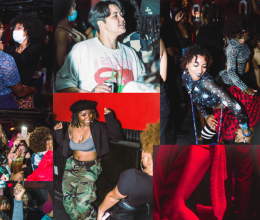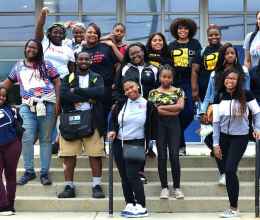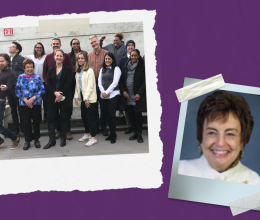
Looking back, Veronica Mosqueda realizes that she’s been organizing since she was a kid. “Organizing is moving people to action from a place of hope and love, not fear,” she says. “And I was doing that when I was a kid in Mexico. My mom would take us to work and leave my brother and me to play with these kids, and I’d always be rallying them to some elaborate game or mission.”
Veronica joined ACLU-D.C. as a Campaign Organizer in August 2021. For her, campaign organizing means building connections and power among communities so that “people have everything they need” to live safe, healthy, and joyful lives.
Originally from Chihuahua, Mexico, Veronica has spent years building multiracial, multilingual, and multigenerational power to advance migrant and housing justice in Texas and D.C. “For me, my experience not being from this country has allowed me to have more questions and curiosity, and to develop an internationalist perspective” she says. “Especially being from Mexico and growing up in Texas, having learned Mexican history and then moving to a state that's teaching literally the opposite about your country.” Veronica shares a Spanish phrase that captures the experience of being in several worlds at once – “ni de aquí, ni de allá, pero de aquí y de allá." Inhabiting multiple worlds means that she can “suspend the belief that this is the only world that can exist.”
Building on these experiences and her own political education via abolitionist organizers Angela Davis and Mariame Kaba, Veronica brings three main principles to her organizing work at ACLU-DC: centering impacted communities, learning from each other, and organizing for the long-term.
For Veronica, the people most affected by oppressive systems should be the people leading the efforts to change those systems, with support from people who can leverage more power in the current system. For example, people who have been through the criminal legal system should lead the way on how to change it, with support from community members such as attorneys or people who have not been arrested or charged.
She also follows the popular education model, “where we are all teachers and students, and we are learning from each other, instead of a hierarchical method of imparting wisdom to people who already have the wisdom and who need resources to move forward with what they know they need in their communities.”
Building power with impacted communities at the center means that we all take the time to build trust and real relationships with each other. “We need to trust that we can develop with folks, instead of trying to speed through a process to achieve X goal.” She says that we should learn from “movements in the Global South, which really take their time,” because “building movements that are powerful, that actually deliver material wins and shift systems of power, take time.” The end goal of Veronica’s organizing is “changing material conditions so people have the right to make the best choices for themselves and their communities.”
As an organizer and immigrant, Veronica brings one overarching lesson with her to ACLU-D.C.: “We can build a better world,” she says, “and we can build it in our lifetimes.”
In her role at ACLU-D.C., Veronica organizes several campaigns that aim to bring the District closer to liberation. Her work includes building Police-Free Schools – a coalition effort led by the Black and brown youth of Black Swan Academy, to stop criminalizing our Black and brown kids in schools. Veronica supports the efforts of D.C. youth, families, and school communities to divest from all forms of school police, and to invest in resources that will create safer, healthier, and more equitable schools. Veronica is also working to advance the work of Community Oversight of Surveillance in D.C. (COS-DC), so that our communities have control over how D.C. agencies fund, acquire, and use surveillance technology. Veronica is organizing with overpoliced communities to ensure that these important decisions are made democratically by community members, not by police, District agencies, or surveillance vendors behind closed doors.
Are you feeling inspired by Veronica’s story? Take it from Veronica: “We all have different roles to play, and it’s okay to be a beginner,” she says. “Step one is to connect with the people who have already been doing the work locally. Then, consider what you can offer to a movement, with joy and commitment.”
You have a role to play in ACLU-D.C.'s campaigns! If you want to plug in – with joy and commitment – fill out this volunteer form so we can build a better D.C. together.


